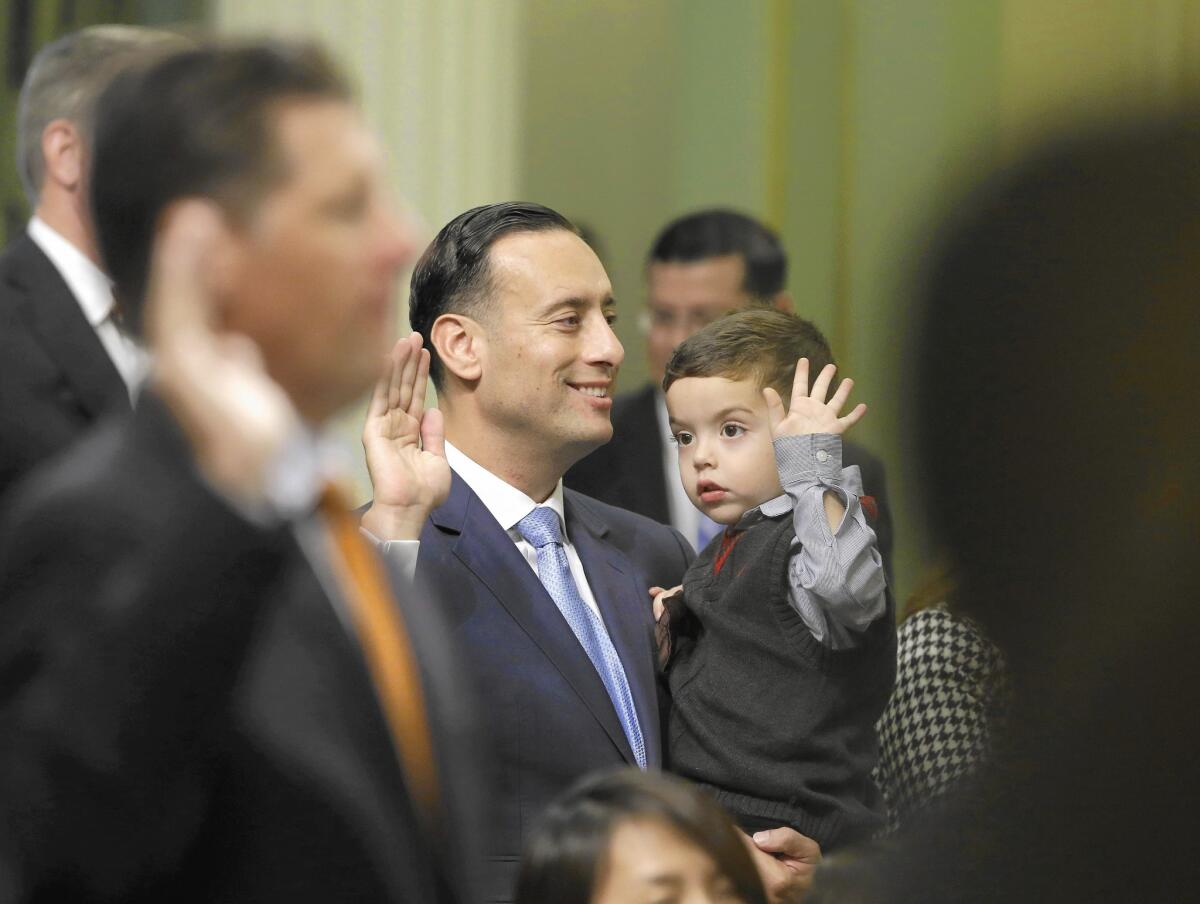California lawmakers set goals as new Legislature convenes

The new legislative session officially began Monday, with lawmakers converging on the Capitol to take the oath of office and legislative leaders signaling that the proposed University of California tuition hikes will be a pivotal policy battle in the coming term.
Thirty-seven new lawmakers — 10 in the Senate and 27 in the Assembly — joined their reelected colleagues, as well as family and loved ones, for the swearing-in ceremony. The revelry was soon followed by a spate of bill introductions marking the start of the new legislative year.
With legislators and staff reconvening after months of recess, the festivities had the flavor of the first day at school. But the ceremony also carried emotional weight for new legislators, such as Assemblyman Tom Lackey (R-Palmdale), who teared up as he took his oath.
“It was a very powerful moment for me,” Lackey said afterward, again choking up. “I’m one of the common guys who rose to a very prominent position, and it’s just a testament that this country still allows opportunity for plain people.”
Both legislative leaders put particular emphasis on the proposed UC tuition increase, which was approved by the system’s regents last month over Gov. Jerry Brown’s objections. The plan would raise tuition as much as 5% each year over the next five years.
Senate President Pro Tem Kevin de León (D-Los Angeles) named education funding as a top item in the “long to-do list” given to lawmakers by their constituents.
“We must fix our education system so that every kid, regardless of who they are, can attend a great school in their neighborhood and afford to go to college in their own state,” De León said.
Both De León and Assembly Speaker Toni Atkins (D-San Diego) are proposing their own plans to address UC funding without relying on tuition increases.
Atkins, in her remarks Monday, also indicated lawmakers will flex their budgetary powers as leverage over the UCs, promising the Assembly will take a “zero-based” budgeting approach that will put increased scrutiny on each individual spending item, rather than using the previous years’ spending as a base.
The approach, she said, would foster a “thorough public discussion of the items contained in the UC budget.”
Atkins’ calls for a more exacting approach to UC spending won applause in the Assembly chamber from both parties. Assembly GOP leader Kristin Olsen (R-Modesto) said Atkins’ proposal was in line with “long-term Republican priorities … of zero-based budgeting [and] of providing high-quality and affordable education systems.”
Monday was also the first day to introduce bills for the new session, and several lawmakers announced plans to revisit legislative fights they had previously lost. They include:
• A measure by Sen. Mark Leno (D-San Francisco) that would raise the minimum wage in California to $11 an hour in 2016, $13 in 2017 and, beginning in 2019, would adjust the minimum wage annually at the rate of inflation.
• A bill that would expand healthcare coverage for people in the country illegally. The proposal, by Sen. Ricardo Lara (D-Bell Gardens) would expand state-funded Medi-Cal and set up a marketplace similar to Covered California for those not eligible under the federal Affordable Care Act.
• A proposal that would give three paid sick days for workers who provide in-home care to elderly or disabled Californians. The bill by Assemblywoman Lorena Gonzalez (D-San Diego) would expand on her successful measure last year that guaranteed three paid sick days to most California employees; in-home care workers are exempted from that law.
Twitter: @melmason
Twitter: @mcgreevy99
More to Read
Sign up for Essential California
The most important California stories and recommendations in your inbox every morning.
You may occasionally receive promotional content from the Los Angeles Times.












